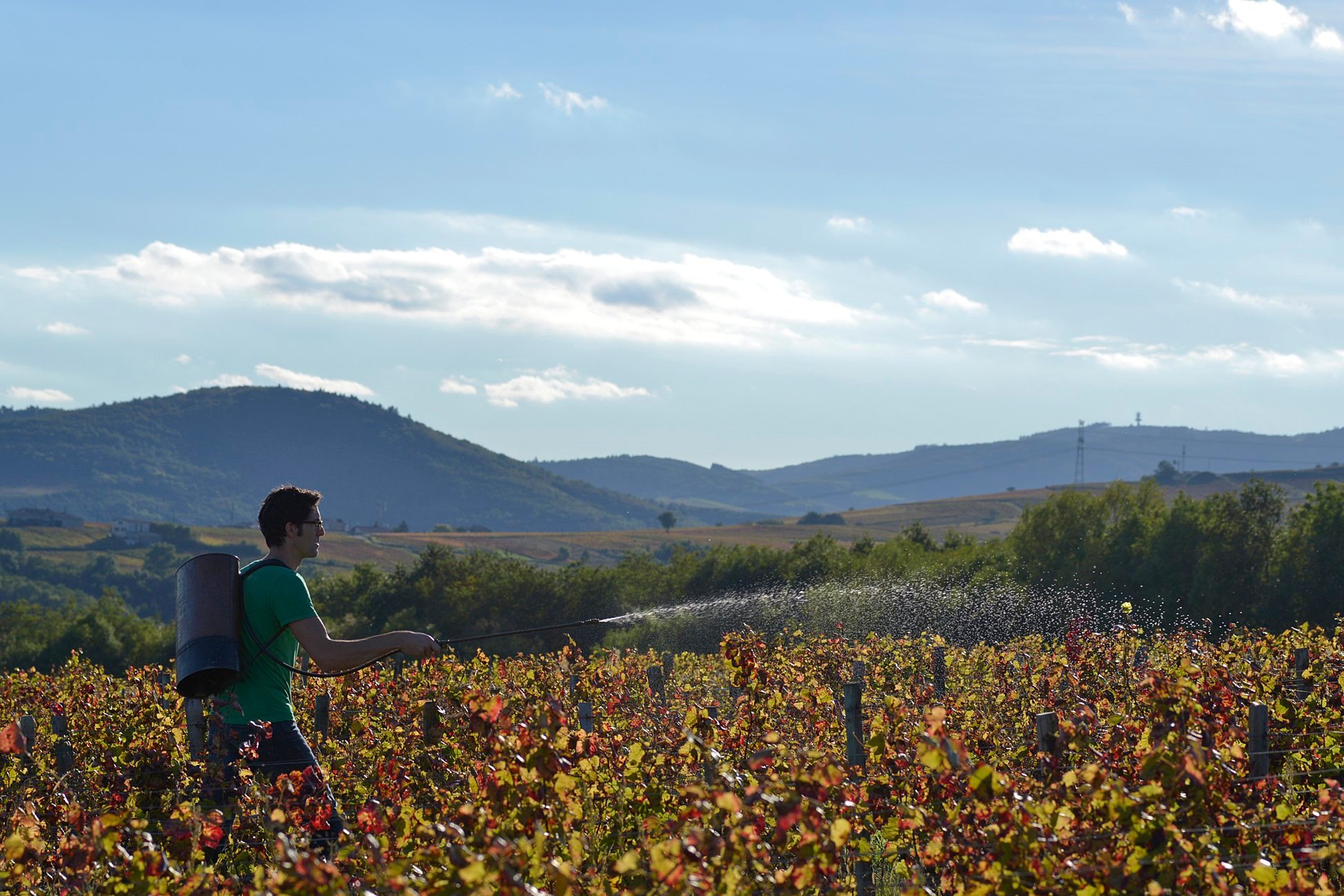
Filosofie / Philosophy
100% Biologisch
De basis om de mooiste wijnen te maken is een gezonde bodem met een rijk bodemleven. Al ons werk in de wijngaard is hierop gebaseerd. In 2025 maken we de start om uiteindelijk 100% biologische wijn te maken.
Om de bodem te voeden zaaien we regelmatig mengsels van bloemen en groenbemesters. Hiermee verrijken we de bodem met humus, goed voor de vruchtbaarheid en bodemstructuur.
Onkruidbestrijding onder de wijnstokken doen we minimaal en alleen door te maaien. Het aantal passages met de trekker proberen we tot een minimum te beperken om de bodem luchtig te houden. Verder maaien we zo min mogelijk om een zo divers mogelijke groenstrook tussen de rijen te houden. Ook voeren we geen grondkerende bewerkingen uit.
We maken gebruik van biologisch dynamische preparaten, groenbemesters en begrazing met schapen in de winter om het bodemleven en de natuurlijke weerstand van de planten te stimuleren. Ook het gebruik van plantenextracten, zoals brandnetelthee en thee van akkerpaardenstaart, helpt hierbij. Daarmee beperken we het gebruik van biologische gewasbeschermingsmiddelen tot een minimum.
Vinificatie
Wijn wordt voor het grootste deel in de wijngaard gemaakt. We grijpen minimaal in om de druiven zoveel mogelijk te laten spreken.
De druiven worden met de hand geplukt en in kratten getransporteerd, om de aroma’s van de druiven zo goed mogelijk te behouden. In de wijngaard vindt reeds de eerste selectie plaats van de druiven, zodat alleen de allerbeste druiven gebruikt worden voor de wijn.
De druiven worden als hele trossen geperst. Het persen gebeurt zacht en langzaam om een zo zuiver mogelijk sap te krijgen. Na een nacht klaren wordt de most overgepompt naar roestvrijstalen tanks of houten vaten waar de gisting plaatsvindt. Bijna alle cuvées worden gemaakt met spontane fermentatie met druifeigen gisten uit de wijngaard en kelder.
De meeste wijnen rijpen 10-11 maanden voordat we gaan bottelen. Dit zorgt voor een goede natuurlijke klaring en stabilisatie van de basiswijn. Voor het bottelen passen we daarom geen of slechts een lichte filtratie toe.
Door te werken met gezonde druiven en door de natuurlijke zuurgraad van de wijn kan het gebruik van sulfiet wordt tot een minimum worden beperkt.
In de kelder werken we hygiënisch met zo min mogelijk interventies en additieven. De kelder bevindt zich in het Nederlandse Margraten, op de grens tussen Nederland en België. De wijn mag daarom niet Belgisch heten maar Nederlandse wijn op basis van in België geteelde druiven. Wat ons betreft is het een 100% Limburgs product.
100% Organic
The basis for making the finest wines is healthy soil with a rich soil life. All our work in the vineyard is based on this. In 2025, we will make the start to eventually make 100% organic wine.
To nourish the soil, we regularly sow mixtures of flowers and green manure crops. By doing so, we enrich the soil with humus, good for fertility and soil structure.
Weed control under the vines is done minimally and only by mowing. We try to keep the number of passes with the tractor to a minimum to keep the soil airy. Furthermore, we mow as little as possible to keep as diverse a green strip as possible between the rows. We also do not carry out soil retaining operations.
We use biodynamic preparations, green manures and grazing with sheep in winter to stimulate soil life and the natural resistance of the plants. The use of plant extracts, such as nettle tea and horsetail tea, also helps. In doing so, we minimise the use of organic plant protection products.
Vinification
Wine is mostly made in the vineyard. We intervene minimally to let the grapes speak for themselves as much as possible.
The grapes are picked by hand and transported in crates, to preserve their aromas as much as possible. Initial selection of the grapes already takes place in the vineyard, so that only the very best grapes are used for the wine.
The grapes are pressed as whole bunches. The pressing is done gently and slowly to get the purest juice possible. After clarifying overnight, the must is pumped over to stainless steel tanks or wooden vats where fermentation takes place. Almost all cuvées are made with spontaneous fermentation using grape's own yeasts from the vineyard and cellar.
Most wines mature for 10-11 months before bottling. This ensures good natural clarification and stabilisation of the base wine. Before bottling, we therefore apply no or only light filtration.
By working with healthy grapes and due to the natural acidity of the wine, the use of sulphite is kept to a minimum.
In the cellar, we work hygienically with as few interventions and additives as possible. The cellar is located in the Dutch town of Margraten, on the border between the Netherlands and Belgium. The wine should therefore not be called Belgian but Dutch wine based on grapes grown in Belgium. As far as we are concerned, it is a 100% Limburg product.